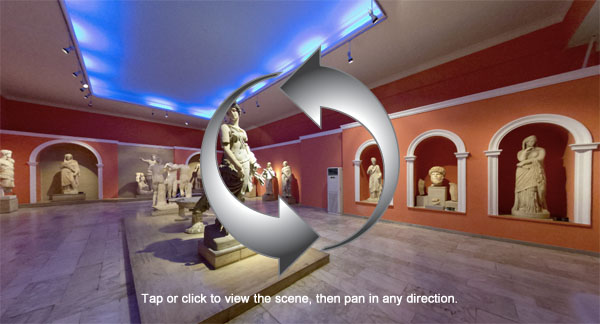
Tap or click on the image to view the panoramic scene. Then pan in any direction.
Wikipedia and Turkey Travel Planner.
Search Results for: Turkey
Aspendos Panoramas
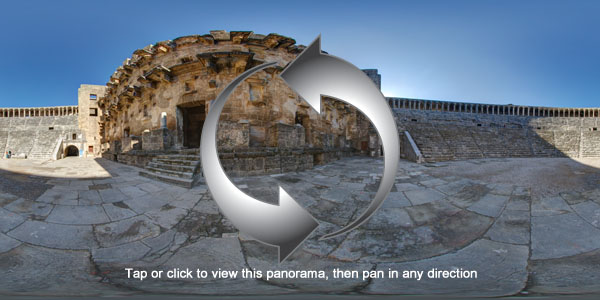
Tap or click on the image to view the panoramic scene. Then pan in any direction.
Wikipedia and Turkey Travel Planner (Tom Brosnahan).
It was a beautiful day during our recent visit to Aspendos, just east of Antalya, Turkey.
A few more Aspendos panoramas: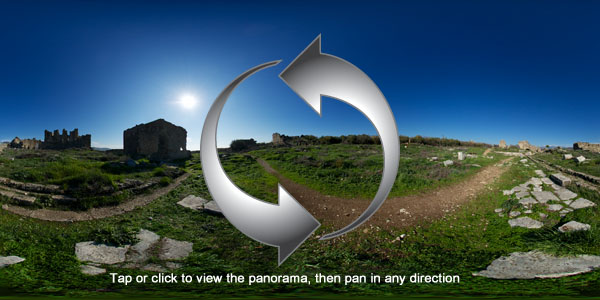
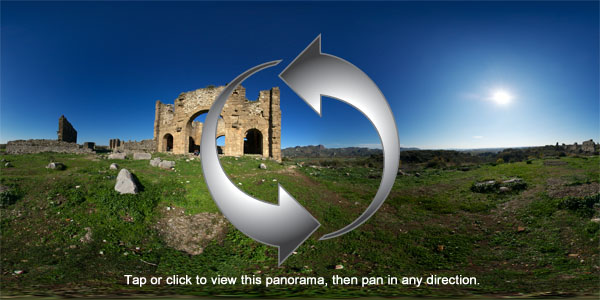

Pamukkale Panorama
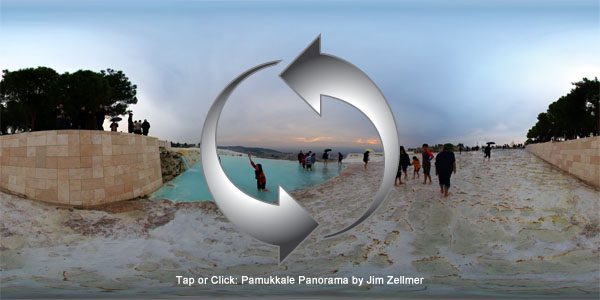
Tap or click on the image to view the panoramic scene. Then pan in any direction.
Wikipedia and Turkey Travel Planner.
Pamukkale was a beautiful and relaxing stop on our recent trip through southwest and central Turkey along with Istanbul.
Incredible journeys
William Dalrymple
Herat, Afghanistan
Herat, in western Afghanistan, is one destination in that tragic country that is still safe, or relatively so. It is one of the most spectacular cities in the entire region and, for a brief period after the death of Timur in 1405, was the capital of the Timurid empire. Here Bihzad illuminated his miniatures; Babur wrote some of the most telling passages in his memoirs; and the Timurid princess Gohar Shad built one of the great colleges of the world. Today there are occasional reports of kidnappings and hold-ups between the airport and the town. But inside the city, there is no sense of tension or danger, and no one looks at you askance as you wander through the mosques, the ruins and the fabulous covered bazaars.
Instead, it feels welcoming, gently prosperous and, by Central Asian standards, surprisingly middle class. On the outskirts, on the hillside of Takht Safar, where the bright young things of Herat gather to watch the sun going down, to picnic, sip tea and listen to music under groves of cedars, mulberries and umbrella pines, you can grasp what Afghanistan would be like if peace were miraculously to break out: it feels not dissimilar, and no more threatening, than inland Turkey. In some ways, Herat feels as if it is high on the Anatolian plateau not far from Ankara; but here, you have the place, and the ruins, to yourself. There is not another traveller to be seen.
When Robert Byron was here in the 1930s he loved not just the grand ruins but also the eccentricity of Herat, and much of that still survives. When our plane touched down on the tarmac, the passengers were not taken into the old 1950s terminal, as the man who had the key had gone off for noon prayers. So, instead, our luggage was delivered by tractor, and dumped on the edge of the apron. It seemed an unsurprising fate for bags carried by an airline, Pamir Air, which at check-in had given me a boarding pass marked “Kabul-Riyadh” and when I pointed out that I was going to Herat, replied that it didn’t matter: “They’ll let you on the plane anyway.”
French Chef Puts Spin On Thanksgiving Dinner
Chef Dominique Crenn was raised in Versailles, France. She now makes an incredible Thanksgiving dinner, but when she first came to the U.S., the entire holiday threw her off.
She sat down with NPR’s Steve Inskeep to discuss how she cooks for Thanksgiving.
“I was a little bit lost when I came here,” she told Inskeep. “I had no idea what Thanksgiving was about.”
In France, turkey is eaten at Christmas. So the American phenomenon of Thanksgiving turkey and dressing mystified her.
“Oh, a month before Christmas, we’re gonna eat Turkey?”
But now, she’s hooked. Crenn has been celebrating Thanksgiving for about 20 years. “This is a pretty cool holiday,” she said.
Microsoft will pay high price for failing to learn history lessons
It’s the metaphors and similes that get me. It’s a shotgun marriage, declared one commentator, ‘with Google holding the gun’. Putting Microsoft and Yahoo together, said another, was like trying to produce an eagle from an alliance of two turkeys.
T his is unfair. Microsoft isn’t a turkey, but a profitable, boring mastodon that entertains fantasies about being able to fly. Yahoo, for its part, is an ageing hippy who invented hang- gliding but aspired to fly 747s and then discovered that he wasn’t very good at it. The mastodon hopes that by employing the hippy it will learn to hang-glide. The hippy’s feelings about the whole deal are plain for all to see.
Microsoft’s $44.6bn offer of cash plus shares for Yahoo has got everyone in a spin, partly because of its sheer size but mostly because they fondly imagine it heralds an exciting future. At last, they think – something that might stop the inexorable advance of Google toward world domination! If that’s what they’re hoping for, then this ain’t it, alas. This isn’t the opening of a new chapter in the history of the computing business, but – as John Markoff observed in the New York Times – ‘the final shot of yesterday’s war’. And even if the merger does take place in a reasonable timescale – and if it can be made to work – it won’t make much of a dent in Google.
Can Burt’s Bees Turn Clorox Green?
IN the summer of 1984, Burt Shavitz, a beekeeper in Maine, picked up Roxanne Quimby, a 33-year-old single mother down on her luck, as she hitchhiked to the post office in Dexter, Me. More than a dozen years Ms. Quimby’s senior, the guy locals called “the bee-man” sold honey in pickle jars from the back of his pickup truck. To Ms. Quimby, he seemed to be living an idyllic life in the wilderness (including making his home inside a small turkey coop).
She offered to help Mr. Shavitz tend to his beehives. The two became lovers and eventually birthed Burt’s Bees, a niche company famous for beeswax lip balm, lotions, soaps and shampoos, as well as for its homespun packaging and feel-good, eco-friendly marketing. The bearded man whose image is used to peddle the products is modeled after Mr. Shavitz.
Today, the couple’s quirky enterprise is owned by the Clorox Company, a consumer products giant best known for making bleach, which bought it for $913 million in November. Clorox plans to turn Burt’s Bees into a mainstream American brand sold in big-box stores like Wal-Mart. Along the way, Clorox executives say, they plan to learn from unusual business practices at Burt’s Bees — many centered on environmental sustainability. Clorox, the company promises, is going green.
A classic American story.
Thanksgiving and Common Cause Unite Diverse Forces
FORWARD OPERATING BASE AIRBORNE, Afghanistan, Nov. 22 — The soldiers filed into the dining tent in the soft light before evening, carrying heaps of food for a Thanksgiving gathering as polyglot as anywhere.
At one plywood table was a Special Forces staff sergeant who was born in Turkey. “No names, please,” he said. At another was Capt. Walter P. De La Vega of the Army, who trains and supervises the Afghan security forces in Wardak Province. He was born in Peru and reared in New Jersey.
Sgt. Kevin J. Quinones, an acoustic guitar player in camouflage, was born in Ponce, Puerto Rico. When he strummed and sang “America the Beautiful,” the soldiers set aside their food and stood.
A cook who prepared the turkey, Specialist Yevgeny Goussev, was born in Moscow and received a work visa to the United States in 2002. He was a reserve artillery lieutenant in the Russian Army, although he said his commission was probably voided when he enlisted in the United States Army last year.
Specialist Goussev became a United States citizen this month. He said he understood what this American holiday meant. “Thanksgiving is to share with other people, and not expecting anything in return,” he said.
O’Donnel’s Thanksgiving Recipes
http://blogs.washingtonpost.com/seasonedgreetings/2005/11/the_morning_aft.html:
e were a group of seven, including two vegetarians and a 15 or 16-pound turkey. The veggies brought their first Tofurky, with some of the trimmings. Their report: Overall not bad, but it gets cold quickly, which makes it less palatable. They were hoping to get their hands on a Celebration Roast, but they were nowhere to be found.
I was home by eight, just in time for “A Charlie Brown Thanksgiving.” The wind was howling that not even a blanket or a few glasses of red wine could warm me up.
Thanksgiving Recipes

Kim O’Donnell discusses a variety of Thanksgiving recipes (including vegetarian) in these easy to use videos.